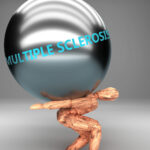A migraine isn’t simply a “bad headache.” Rather, it’s a neurological condition that can appear without warning and render a patient bed bound for days at a time. It can be accompanied by a range of painful symptoms and usually doesn’t respond to standard anti-inflammatory pain medication.
Researchers are yet to solve the puzzle of exactly what causes a migraine, believing it to be a combination of genetics, lifestyle, and environmental factors. This uncertainty makes treating the condition particularly difficult. However, since its legalisation in 2018, many specialists have advocated for medical cannabis for migraines to be used as a strategy to help manage symptoms, particularly for patients who suffer frequent and severe attacks.
Migraines: an overview
Migraines are characterised by intense head pain, but they usually come accompanied by a number of associated symptoms. These symptoms are often referred to as a migraine “aura” — visual, motor, sensory and auditory disturbances that may occur before the actual pain hits.
There are two main categories of migraines: migraine with aura (there will be specific warning signs before the migraine begins) and migraine without aura (no warning signs and generally the more common variety). Some patients report experiencing a “silent migraine” where symptoms are encountered that suggest an attack is imminent, but no pain occurs.
With or without an aura, patients can also suffer from nausea, increased sensitivity to light and sound, sweating, loss of concentration, and diarrhoea. These symptoms may last anywhere from a couple of hours to a few days.
The exact cause of a migraine is unknown. Researchers believe they may result from abnormal brain activity. Other triggers can include hormonal changes associated with menstruation and menopause, alcohol, caffeine, stress, medication, and a poor diet.
There is no official test that will confirm the diagnosis of a migraine. Rather, your general practitioner is likely to ask you a series of questions to determine the frequency, pattern, and severity of your attacks. There is also, unfortunately, no cure for migraines, which is particularly devastating for those who suffer from the condition on a chronic level.
Treatment methods
As is the case with many chronic conditions, while there is no cure, there are strategies you can implement to reduce the severity of symptoms. It’s best to seek advice from a medical professional, who will be able to tailor a treatment plan that takes into account your medical history.
Migraines are not always preventable but if you know that your condition is exacerbated by a poor diet, lack of exercise, or too much time spent staring at a screen, lifestyle changes may reduce the frequency of severity of symptoms.
Medical cannabis for migraines
Cannabis has been used by humans for medical purposes as far back as 2700 BC. However, it has had somewhat of a chequered past in the United Kingdom (and indeed, most countries,) and it was not until 2018 that it was legalised for medical use.
Derived from the cannabis plant, medical cannabis is grown in a highly regulated environment, making medical cannabis for headaches very different from recreational cannabis. It contains a number of substances, most notably delta-9-tetrahydrocannabinol (THC) and cannabidiol (CBD), two cannabinoids that interact with receptors in our endocannabinoid system. The endocannabinoid system is widespread and plays a number of important roles, including maintaining homeostasis and modulating pain.
As is the case with any type of prescription medication, a specialist will take into account a number of factors before deciding whether unlicensed medical cannabis products are the most appropriate treatment method for a patient. These factors can include what types of therapies and treatments they have previously tried as well as any pre-existing health conditions they have. Note also that to be eligible for medical cannabis, you must have been prescribed at least two medicines by a doctor.
At MyAccess Clinics, our team of trained and experienced specialists are passionate about helping patients find relief from debilitating symptoms associated with chronic health conditions, including migraines. To determine whether you are eligible for a medical cannabis prescription and to learn more about this medication, contact the team today.





